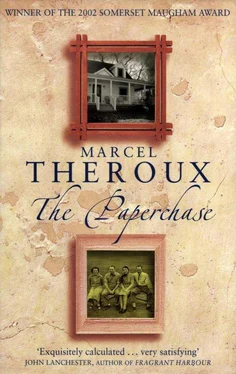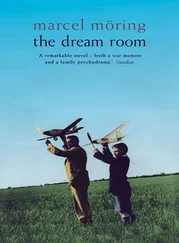Bit by bit, I began to establish a routine that made me feel less adrift. I bought a shortwave radio to keep in touch with the world beyond the island. I thought of my colleagues in the television newsroom hustling to produce the bulletins. For a while I wrote down the headlines in a notebook, as a way of marking off the passing days. But it made me feel like a prisoner scratching lines on the walls of a cell, so I stopped.
The wind always changed direction in the midafternoon and then picked up, making the wood of my eyrie creak. That was my signal to go downstairs, have a martini and cook myself spaghetti on the two electric rings I’d bought from the hardware store. Each evening, I read in Patrick’s library until my eyes began to close over the pages. I found that I slept better and I dreamed more — or remembered more of my dreams, anyway, which seemed healthy.
I spent almost two days searching the house for something that would explain the fragment of writing I had read on the plane. There was nothing, not a trace, although in a filing cabinet in the basement I found manuscripts of Patrick’s novels along with carbon copies of correspondence.
In one folder I found a letter on Harvard stationery inviting a priest — let’s call him Father Xavier — to give a talk to the Harvard Theological Society. The letter was fulsome; it praised the priest’s work, his publications. It even hinted that he would be paid generously for the lecture. Father Xavier’s response was not included, but from the next letter it was obvious that he had taken the bait. Patrick’s second letter was a derisive attack, written on the same stationery, in which he called the priest an ‘intellectual stick figure’. ‘When we need a jug-eared ass-kisser to address the society, rest assured you will be our first port of call.’
There were some unspeakable letters to my father; a crazy letter to Nancy Reagan in the White House in which Patrick called her ‘a one-titted witch’. In another letter — apparently in response to a request for an interview from a prospective biographer — Patrick bragged about having a wealthy patron to support him in a libel action and stopped just short of an outright threat to break the recipient’s fingers.
Some of them were funny, but too often you felt that Patrick’s attack was out of control. It was shocking to feel the force of his hatred, even second-hand. What made them so potent was that the venom was allied with an acute sensitivity to people’s weaknesses. He knew where to stick the knife and how to twist it. Even when his attacks went wide of the mark, there was something so concentrated, so spectacularly ruthless in his efforts to offend, that the effect was still unsettling. Everything was thrown at the attackee: crimes, sins, birthmarks, poor grades, big ears, bad debts, flat feet, buck teeth, homely relatives. You sensed Patrick thought somehow that he was always on the side of the angels; somehow, he was the one victimised and misunderstood and therefore justified in whatever he flung back at his tormentors. I couldn’t face reading more of them. They were an unworthy epitaph: his brilliance, his humour, his erudition, his empathy — all subjugated to the desire to wound. And I knew — because I had known him — that they weren’t the whole story.
Patrick and I had been working in his garden once. An apple tree had fallen down in a storm. Its silvery trunk was blistered with lichen the colour of oxidised copper — a very soft green. We dragged the sawn-off branches up the garden. ‘Jeez, you’re a strong sonofabitch,’ he said. This made me brim with pride — particularly as I was thirteen and undersized for my age, with arms and legs like pipe cleaners.
When we were finished we picked cherry tomatoes from the small vegetable garden on the lawn. They had a very herby and intense flavour. We sat outside the summer kitchen eating them from a colander. ‘Do you ever give the finger to God?’ he asked me.
‘Not really,’ I said, wondering what my father would make of this blasphemy.
‘You don’t ever want to throw up the window, flip Him the finger and say, “Eat me!”?’
I shook my head. He looked mildly surprised as he popped a handful of tomatoes into his mouth.
Another time we went rowing together off Pilgrim Point. We had rowed out about a mile and half on to the black water of the open ocean when the current seemed to alter. It began in one corner of the sea in front of us — a little patch of waves dancing up from the flat water — then it spread, until it was all around us.
‘Know what I think, Skipper?’ said Patrick, as a wave slopped in over the side of the boat.
‘That we should get out of here?’ I said.
The rowboat had two sets of oars and we pulled like madmen for the safer waters of the point. Patrick explained that the trick was to keep the waves abaft us and not to take them beam on, or we would capsize. Even at that moment, when we were both fearing for our lives, I liked the sound of those unfamiliar words: ‘abaft’, ‘beam on’, ‘capsize’.
When we got to shore, Patrick made me promise not to tell my father what had happened. I was a little proud of myself: there was a bond between us — first of shared fear, and now a secret.
I didn’t know which was stranger: to be remembering so much about Patrick, or to have forgotten so much in the first place. My uncle had been indispensable — whatever his faults, his love and curiosity had softened some of the austerity of my childhood. He was a spokesman for the importance of small things, enthusiasms, hobbies, games, puzzles, jokes, words, hot fudge, cream cakes, fried dough — all helpful talismans in a cold and draughty world that seemed to belong on the whole to people like my father.
I wasn’t the only person who felt like this — it’s why people over and over again were prepared to forgive him when he acted out of a child’s untempered indignation and wrote them one of those letters, or told them to their face that they were a pain in the ass, or berated them for some peccadillo.
I often dreamed about Patrick — not surprising when you think that the whole house vibrated with his presence. I encountered it everywhere. It was apparent in the look of the house, the possessions with all their associations — any visitor would have noticed that. But living there gave me a more pervasive sense of him. Over time, his preoccupations became my preoccupations: I fretted over the low water pressure in the shower; I worried about cutting the grass; I kept milk and drinks cold in a box-cooler that Patrick had left under the kitchen table. The house bore the impress of Patrick’s personality so strongly that by fitting myself into it, I began to resemble him.
I didn’t notice it at first; the feeling stole up on me. Then one afternoon I was queuing in the post office to send some letters back to London and I caught a glimpse of myself in the mirror above the counter. Because it was a nuisance to drive into the town to do laundry I had got in the habit of supplementing my clothes with Patrick’s — I borrowed a shirt or two, a pea jacket to wear on cool evenings, an old pair of trousers for wearing when I painted or cut the grass. I was shocked by the reflection partly because it was out of step with the image I had of myself: my hair had grown and was unkempt from my fingering it at the easel; I was unshaven and my clothes looked ragged. But I was also shocked that I looked so much like Patrick. And I thought I detected a watchfulness behind the postmistress’s breezy efficiency.
That afternoon I drove up to the running track behind the high school. It wasn’t just morbid curiosity. I wanted a clue. Perhaps the scene of his death would provide it.
Heat haze shimmered above the edges of the running track so that it looked as though it were cooking on an enormous griddle. The school’s sports grounds had been carved out of a scrubby pine forest that was making halfhearted efforts to regain territory. Long strands of creeper reached almost to the one-hundred-metre start line — the straight bit of track that was joined on to the circuit like the tail of the letter Q. Poison ivy was growing thickly among the grass, some of it green, some of it brazen or bright red. Come September it would all be chased back to the woods, but for now it was permitted a temporary reconquest.
Читать дальше












